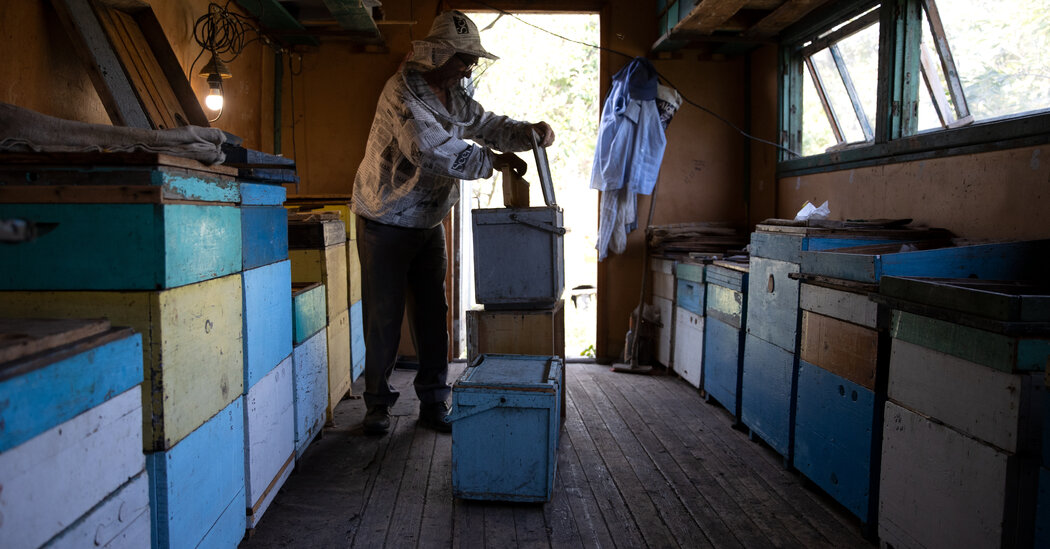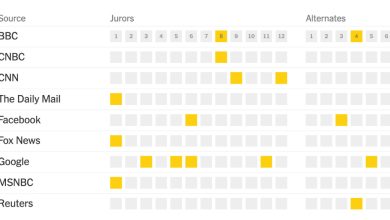
His Bees Fly to the Front Line. Soon, It May Come to Him.
BOHDANIVKA, Ukraine — By the time the weather warmed after a cold spring, the fields of sunflowers where for decades Petro Fedorovych’s bees would gather nectar to make their amber honey were mostly unplanted and abandoned.
The war had crept across the eastern Ukrainian steppe after Russia’s invasion in February. The city of Sievierodonetsk fell, then Lysychansk. The front lines moved until the incessant thuds and bangs of artillery arrived around the beekeeper’s small village, Bohdanivka, with the heat.
But still his bees left their hives just as they had every summer. Petro Fedorovych, 71, watched them fly beyond their familiar fields. They flew toward the roads and shell craters, closer and closer to the front line where Russian and Ukrainian troops were killing one another with guns, grenades and rockets.
And then they flew home.
Millions of Ukrainians have fled their homes since the war began more than six months ago. But many have stayed, sheltering in basements and elsewhere, resolute in their decision to brave the onslaught for a litany of reasons: nowhere else to go, no money, disabled family members, pro-Russian sentiments. The list goes on.
But Petro Fedorovych’s decision to remain at his house with his bees and his wife, Ira, and their goat, Flower, was as simple as it gets: It was their home. It was a world unto itself, where even the destruction slowly encroaching felt more favorable than the unknown in the cities and towns beyond Russian artillery range.
“I built this house with my hands,” he said late last month, his gray hair unkempt and sweat from a morning of beekeeping already forming on his brow. “I will never leave.”
All wars are terrible, but the war in Ukraine stands out because of its brutal methodology. Artillery can turn villages like Bohdanivka into graveyards almost overnight. If Russian troops want to advance, they will do so slowly, chewing up virtually everything in their path with so much ordnance that uninterrupted moments of silence make a stomach-tightening anxiety a complement to the next horror.
Bohdanivka, with a population of around 150 people, lies between where Russian troops are now, and where they want to go: the rest of the Donbas, a region of rolling fields, mining towns and the hundreds of thousands of Petro Fedorovych’s bees.
The State of the War
- Zaporizhzhia Nuclear Plant: After United Nations inspectors visited the Russian-controlled facility last week amid continuing shelling and fears of a looming nuclear catastrophe, the organization released a report calling for Russia and Ukraine to halt all military activity around the complex.
- An Expanding Military: Though President Vladimir V. Putin ordered a sharp increase in the size of Russia’s armed forces, he seems reluctant to declare a draft. Here is why.
- Russia’s Military Supplies: According to newly declassified American intelligence, Russia is buying millions of artillery shells and rockets from North Korea — a sign that global sanctions have severely restricted its supply chains and forced Moscow to turn to pariah states.
- Far From the War: Though much of Russia’s effort on the battlefield has not gone as Mr. Putin had planned, at home he has mostly succeeded in shielding Russians from the hardships of war — no draft, no mass funerals, no feelings of loss or conflict.
To Petro Fedorovych, who served in the Soviet Army at the height of the Cold War, Russia’s invasion is neither an invasion nor a war; it is just “it.” The war did not begin, “it began,” he said.
“They are abusing the people, and that’s it,” he said, not naming Ukraine or Russia. The sharp crack of outgoing artillery fire sounded nearby.
After he left the military, he moved to Bohdanivka in 1972, where he worked long hours as a veterinarian on a collective dairy farm. Ira was a nurse in the nearby city of what was then called Artemivsk, now Bakhmut. They met soon after, though it took some time for him to muster up the courage to talk to her.
They married on June 19, 1976, and had two daughters and a son. After the Soviet Union collapsed, Petro Fedorovych built his family a two-story brick house on Bohdanivka’s outskirts. They were surrounded by tranquil fields and near a reservoir where the Ukrainian Army has now placed troops and vehicles.
For his bees, he built blue-painted wooden hives that litter his backyard like beacons among the tall grass, their inhabitants furiously commuting among the chickens, a dilapidated white Volga sedan and clusters of phacelia, viper’s bugloss and mustard plants. The iron fence that faces the street was once lined with roses, Ira said, but this season they are gone.
Bees have been a part of Petro Fedorovych’s life since he was a child in what is now western Russia. His father fought with the Soviet Army in World War II and participated in some of its most vicious battles, including the defense of Brest in 1941.
The bees, he reckoned, were a way for his father to adjust to civilian life and leave that war behind when he started beekeeping in the 1950s.
Now another war was approaching, after a nearly decade-long reprieve, after Ukrainian forces beat back Russian-backed separatists from nearby villages and the city of Bakhmut in 2014.
“When it all started eight years ago, the village nearby, Klishchiivka, was pounded heavily,” he said. “I had a lot of bees in winter, and the glass in our windows was clinking. And the bees were dispersing in winter because of the rumble.”
The bees’ population, he said, never fully recovered from that winter. This summer, his roughly two dozen families of bees are far angrier than they once were. Ira, his wife, dares not venture near the hives for fear of being stung, and the beekeeper has a small smoker filled with burning wood that he frequently uses to calm the insects.
“The bees became different,” he said, referring to the shelling. “Ira won’t go in the garden, they won’t give her a minute’s rest. It’s because of the noise.”
Sounds of Shelling at a Bee Farm in Bohdanivka
The frequent artillery fire has aggravated Petro Fedorovych’s bees, making them more aggressive.
“Bees,” Ira noted, “love silence.”
“They need it.”
There is no more silence in Bohdanivka, a place known for its solitude, where people could spend quiet weekends away from Bakhmut or other cities in the Donbas such as Kramatorsk and Sloviansk.
Now, Bohdanivka is becoming a frontline town. And, Petro Fedorovych’s bees, he noted with a sad smile, have become “frontline bees.”
After flying several miles toward the fighting over the summer, the prime honey-making months, the bees returned with roughly 650 pounds of honey. It was a good haul by any season’s standard.
“I was thinking that I won’t get anything at all,” he said, noting that the bees were most likely drawn toward the front because sunflowers had been planted quickly there earlier in the year.
As the fighting nears, many beekeepers from Bohdanivka and nearby Bakhmut have fled, leaving fewer colleagues to share notes with in an already somewhat solitary profession.
But still, even with the shriek of rockets overhead, the beekeeper tended to some of his last honey frames of the season. He scraped the wax, placed the frames in the centrifuge and spun, until the rich harvest drained to the bottom and, finally, into a glass cup.
“It’s amber, right?” he said proudly. “See how it comes and folds like this?”
Sunflower honey was still his favorite after decades of beekeeping. But now, in his twilight, there was no one to take up his life’s work and to take care of the bees that he would rather die for than abandon.
“Of course, Dad dreams that someone in the family will inherit this trade, but so far the grandkids are growing up” and showing little interest, said Lilia, the family’s youngest daughter, sitting in a restaurant hundreds of miles away in Kyiv, the Ukrainian capital.
Lilia has watched in fear as the war comes closer to her parents’ home. A nurse like her mother, Lilia sells honey her father mails to the neighbors; a pound costs roughly a dollar. Two years ago, Lilia, 45, bought her father a new beekeeper suit, decorated with newspaper front pages, off the internet.
Lilia has tried again and again to get her parents to leave Bohdanivka, but to no avail.
“It especially hurts when our friends and acquaintances take their parents away,” she said. “But they are taking them out. And me, however I approach this topic, they won’t agree.”
“Dad won’t leave behind his children,” she added, speaking of the bees. His other children had left home long ago.
Dimitry Yatsenko contributed reporting.




